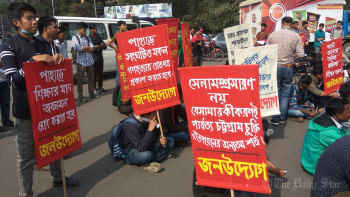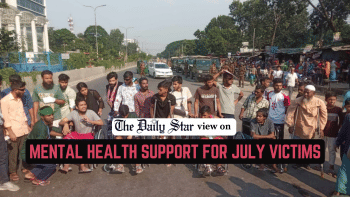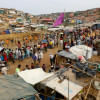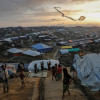Born in displacement: The forgotten childhoods of Rohingya refugee kids

Seven years. That is how long it has been since hundreds of thousands of Rohingya children were forced to flee their homes in Myanmar, leaving behind everything they knew. In the makeshift camps of Cox's Bazar, Bangladesh, these children have spent nearly their entire lives in displacement, trapped in a cycle of trauma, poverty and uncertainty. Born into this crisis or carried as infants through borders of despair, they have witnessed horrors no child should ever know. And yet, their future—one full of hope, dreams and opportunity—remains hopelessly out of reach.
What is it like to be a child who has never known peace? Who has never experienced the simple joys of a stable home? This is the cruel reality for the Rohingya children of Bangladesh's refugee camps. They live in a perpetual state of limbo, victims of a political conflict not of their making, with no end in sight. These children, whose futures should be filled with possibility, are instead robbed of the basic rights every child should have—security, education, health and a sense of belonging. In this heartbreaking silence, they are waiting for a future that seems increasingly uncertain.
The crisis: A lost childhood
The Rohingya refugee crisis is one of the most pressing humanitarian disasters of our time. Nearly a million refugees, half of whom are children, have fled Myanmar's brutal military persecution to seek shelter in Bangladesh. Among them are thousands of children who have known nothing but the confines of overcrowded camps, where survival is a daily struggle. They are caught in a never-ending cycle of displacement, poverty and neglect, facing challenges no child should ever have to endure.
In Cox's Bazar, where more than 400,000 Rohingya children live, basic needs such as food, water and safety remain constantly at risk. These children live in shelters made of tarps and bamboo, constantly threatened by natural disasters, fires and violence. The camps are overcrowded, with limited access to essential services. But perhaps the greatest tragedy of all is the lack of opportunity—particularly in education.
Take, for instance, Shakeera Bibi, a twelve-year-old girl who dreams of becoming a doctor. Shakeera's story is emblematic of the millions of Rohingya children who have been denied the right to grow, learn and thrive. Shakeera, like so many others, is far behind in her studies. While children in her home country would be in the sixth grade by now, Shakeera is still in the second grade, struggling to keep up. The education system in the camps is based on the Myanmar curriculum, which was designed for children who would one day return to Myanmar. But with no clear path to repatriation, this education system has become increasingly irrelevant. The children are receiving a curriculum that doesn't prepare them for a future beyond the camps, leaving them at a profound disadvantage.
The education they receive is not only outdated, but also inadequate. Teachers, like Nazim Ullah, work under extremely difficult conditions, often lacking the necessary resources, training and certification to deliver quality education. The classrooms are overcrowded, with hundreds of children crammed into small spaces, often with no proper desks, chairs or even basic teaching materials. For many children, going to school has become a distant dream and their hopes of a better future seem impossible to achieve.
Malnutrition and health crisis
The tragedy doesn't stop with education. Rohingya children in the camps are also suffering from severe malnutrition. They receive three meals a day, these meals are far from nutritious. The lack of access to fresh fruits, vegetables and protein-rich foods have left children with stunted growth, weakened immune systems and an increased risk of disease. Malnutrition, particularly in the first years of life, has lifelong consequences, hindering cognitive development and diminishing the chances of these children ever reaching their full potential.
In addition to malnutrition, healthcare services in the camps are limited. Many children suffer from preventable diseases and the lack of proper medical care exacerbates their already fragile health. But it's not just physical health that is at risk—mental health has also become a silent crisis. Many of these children have witnessed violence, loss and trauma that no child should ever experience. They have seen their homes destroyed, their families torn apart, and their futures shattered. Yet, there is a severe lack of mental health services to help these children process their trauma and begin to heal.
The psychological toll of living in constant fear, uncertainty, and deprivation is immense. Child welfare experts emphasise the urgent need for psychological support, yet the international response has been far too slow and inadequate. Without addressing the mental health needs of these children, we are condemning them to a future marked by the scars of war, poverty and displacement.
The safety of children: A constant threat
The safety of Rohingya children is also a growing concern. The camps, already overcrowded and poorly maintained, are breeding grounds for violence, trafficking and exploitation. In recent years, reports have emerged of armed attacks on children, including killings and abductions. Many children, like Shakeera's younger siblings, are not allowed to leave their homes because of the dangers they face outside. The camps are increasingly unsafe for children, and parents live in constant fear of what may happen to their children if they venture too far from the shelter of their homes.
The lack of legal status for the Rohingya refugees only exacerbates these dangers. As stateless individuals, Rohingya children are denied basic rights, including the right to education, healthcare and protection from exploitation. The absence of legal recognition means these children are more vulnerable to trafficking, early marriage and forced labour. Many children are sent to work to support their families, including Rashid Ullah, an eleven-year-old boy who sells betel leaves to contribute to his family's income. But working in dangerous conditions, with no access to education, only prolongs their suffering.
A future lost in limbo
For these children, the future seems increasingly bleak. They are living in a state of limbo, caught between the trauma of the past and the uncertainty of the future. Many of them, like Rima, a fourteen-year-old girl, express a deep sense of hopelessness. "We fled for our lives, but we're still in the midst of war. Here, we have no life at all," she says, capturing the despair that so many children in the camps feel. The future they once dreamed of now seems impossible to reach, and the world is failing them.
But the future doesn't have to be this way. The international community has a responsibility to act. Humanitarian aid is not enough. These children need education, mental health support and legal recognition. They need to be given the tools to break free from the cycle of poverty and displacement. They deserve the opportunity to grow, learn and achieve their dreams. The world cannot afford to forget them.
The ultimate solution to the Rohingya crisis lies in repatriation. But until that day comes, we must not let these children remain forgotten. We must not allow them to live in limbo forever. The time to act is now. The world must rise to the challenge and ensure that every Rohingya child can grow, dream and thrive once again. Their future depends on the actions we take today.
Dr Rakib Al Hasan is a young physician, author, activist & international award-winning youth leader of Bangladesh. He is the founder and executive director of the Centre for Partnership Initiative. He can be reached at [email protected]
Views expressed in this article are the author's own.
Follow The Daily Star Opinion on Facebook for the latest opinions, commentaries and analyses by experts and professionals. To contribute your article or letter to The Daily Star Opinion, see our guidelines for submission.

 For all latest news, follow The Daily Star's Google News channel.
For all latest news, follow The Daily Star's Google News channel. 







Comments